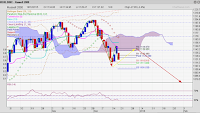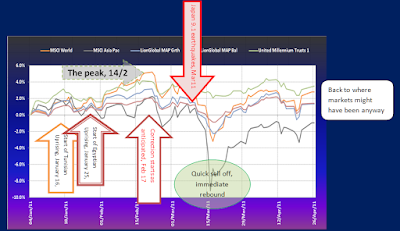OCTOBER TURNS Part 1, Gold
October 7, 2016
A Month With A Bad Record!
Statistically, October has the worst record for stock markets. So far, I am inclined to say, it's happening again. Indeed, sometimes, markets leave me speechless. This week for instance.
Last Friday (September 30), we still paid $1324 for the ounce. The rally seemed intact, the USD range bound. On Monday, some profit taking set in, nothing out of the norm, as gold prices retreated to $1313. Tuesday morning still looked fine. And then, from 1 p.m. to 10 p.m. (end of day trading in the US), gold fell to $1268, a loss of 3.5%. That price level I considered save for a number of reasons, had it not frequently proven to be a formidable support level. But it wasn't to be.
Today, Gold is priced $1252 at their lowest point, and I am not convinced that this is a level from which to expect a rebound. Indeed, right now, the best thing for prices to happen is to retreat to $1200. From such an oversold position at least, the rebound will be a worthwhile opportunity.
These events alone don't confound my understanding, but the reasons, banded about as a cause, do. The media says: BREXIT did it! In other words, a resurging, sudden realisation maybe of what it could do to Britain? Or rather, a horror image of doom and gloom, of what could become of Great Britain outside of the EU, must have lead to the action of some who thought it best to sell / attack the British Pound. We see the result, the Pound did go down. first against the USD, and today against the Euro, too. The fall on Tuesday amounted to a HUMUNGOUS 1%! It is noteworthy, but does it warrant the 3.5% price drop in gold? Today, the Pound lost 2% to the USD and gold traded - sideways. Correlation that changes polarity each day?
Taking the week as a whole, the fall in the GBP to the USD was -4.5%, to the EUR -3.3%. Gold prices dropped most on the Tuesday, but overall they fell -5.5%. Over the week, one could see these events as connected, if you are really desperate. However, investors are not computer generated algorithms. They choose to move between assets when it suits them, not when stop losses and other triggers dictate. For instance, we can see today and for much of the week, equities in the UK rising in response to a weakening Pound. It is like compensating for the weaker currency, a kind of international adjustment. That I see happening very often when currencies fluctuate, although the mechanism, the opportunity for arbitration, - how it happens and who responds to such a situation - I have yet to figure out By the way, you can observe the opposite reaction in the US stocks, too, this week. As the USD rises, stocks struggle to get ahead, even though in other regions, equities rallied decisively.
Looks like, investors throw out the gold for the USD and some equities. And maybe a little flutter on oil prices.
More on the coming October turns over the weekend.




Comments